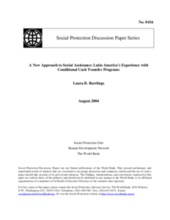Conditional cash transfers are a departure from more traditional approaches to social assistance that represents an innovative and increasingly popular channel for the delivery of social services. Conditional cash transfers provide money to poor families contingent upon certain behavior, usually investments in human capital such as sending children to school or bringing them to health centers on a regular basis. They seek both to address traditional short-term income support objectives, as well as to promote the longer-term accumulation of human capital by serving as a demand-side complement to the supply of health and education services. Evaluation results from a first generation of programs reveal that this innovative design has been quite successful in addressing many of the criticisms of social assistance such as poor poverty targeting, disincentive effects, and limited welfare impacts. There is clear evidence of success from programs in Brazil, Colombia, Mexico and Nicaragua in increasing enrollment rates, improving preventive health care and raising household consumption. Despite this promising evidence, many questions remain unanswered about conditional cash transfer programs, including the replicability of their success under different conditions, their role within a broader social protection system, and their long-term effectiveness in preventing the inter-generational transmission of poverty. One of the main challenges facing policymakers today is how to build off of the established success of conditional cash transfer programs to tackle the more difficult issues of improving the quality of health and education services amore holistic approach to both social protection and chronic poverty.
©The World Bank

